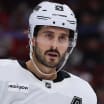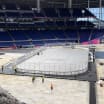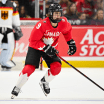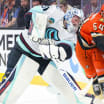NEW YORK -- In his third game of the 2016 Stanley Cup Playoffs, the real Evgeni Malkin finally showed up.
"I know I can help the team," the Pittsburgh Penguins center confidently said following his two goals and two assists in a 5-0 win against the New York Rangers in Game 4 of the Eastern Conference First Round on Thursday. "I know I can help the team to win every game."
Malkin making things happen for Penguins
Back from injury, center gets going with four-point game against Rangers
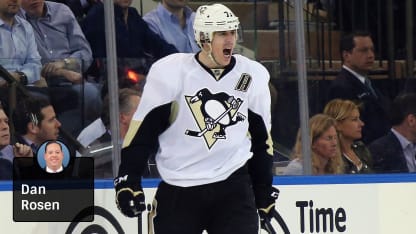
That sound you just heard was a collective gasp from everyone else who is still dreaming of winning the Stanley Cup this year.
Geno's back, feeling good and looking powerful. Run and hide.
"He is so good," Penguins defenseman Ben Lovejoy said.
Malkin was so dominant with four points at Madison Square Garden. He was the difference from start to finish in what may have been the Penguins' most complete game since Mike Sullivan coached his first game Dec. 14.
The Penguins lead the best-of-7 series 3-1. One of its best players is just getting going, with Game 5 in Pittsburgh on Saturday (3 p.m. ET; NBC, SN360, TVA Sports).
"It's so much better," Malkin said. "Finally, I started to play a little bit better."
If you believe Sullivan, this was the plan the Penguins had for Malkin all along. They figured he'd have to shake off some rust and rediscover himself after missing more than a month of hockey, 16 games in all, before returning from an upper-body injury sustained March 11 to play in Game 2 on Saturday.
"No matter how good you are, I think it takes some time to get back into the game mode, where your timing is there, the intensity level is there," Sullivan said. "It's hard to simulate in a practice environment or a controlled environment the intensity of game situations, especially playoff game situations."
But Sullivan was unhappy with Malkin's performance in Game 3 even if the coach wouldn't admit it. He played Malkin 13:30, his least ice time in a playoff game since 2007. He didn't play at all in the final 5:27 of the 3-1 win.
Some of that late in the game might have been situational, with the Penguins protecting a one-goal lead, but let's not forget that in the second period, Malkin made the mistake that led to Rick Nash's shorthanded goal against and had a tripping penalty while heading to the bench.
Malkin admitted he spoke to Sullivan about that game and said he had to watch video to go over his mistakes. He said it made him feel better. It obviously made him play better, because he was everywhere in Game 4.
He had an assist on Pittsburgh's goal 69 seconds into the game because he sprung Lovejoy for a rush that resulted in a rebound goal for Eric Fehr. It was Malkin's shot from the point that led to Patric Hornqvist's double-deflection goal at 7:11 of the first period.
Malkin scored his first power-play goal on a one-timer from inside the blue line that beelined past Henrik Lundqvist on the glove side at 4:00 of the second period. Malkin scored another power-play goal at 3:28 of the third.
"Certainly, I thought he took another big step [Thursday]," Sullivan said. "I thought his timing was better. He's getting stronger. His conditioning is getting better with each game he plays. That's quite honestly what we expected to go through with Geno. I know there was a lot made of [the late-game benching in Game 3], but I think a lot of it for me, it was really nothing. He's going to help us win. He's a dynamic player, as you saw tonight."
That we did is an indicator that maybe the storyline that followed Malkin into the playoffs was misguided, off base.
The theory was that the Penguins were so good without Malkin, going 13-2-0 in the last 15 games of the regular season, that it would be difficult to work him back into the lineup without it disrupting Pittsburgh's obvious chemistry.
The Penguins were doing everything to hold back their laughter at that after Game 4.
"It shouldn't have been a storyline if it was," Lovejoy said. "As soon as that guy is healthy enough to play he should be inserted back into playing big minutes even for a team playing its best hockey."
But Malkin's return in Game 2 still seemed to create a conundrum for Sullivan. He didn't want to tinker with the two scoring lines featuring Crosby, Hornqvist and Chris Kunitz, and Phil Kessel, Carl Hagelin and Nick Bonino, so Malkin played with Conor Sheary and Bryan Rust. That line wasn't effective, and Malkin wound up playing with Crosby a lot. They've never been an ideal pair because each thrives when he has the puck.
Sullivan went to Malkin with Sheary and Fehr to start Game 3, but by the middle of it he replaced Sheary with Kunitz. Malkin didn't play well, but Sullivan stuck with Malkin between Fehr and Kunitz for Game 4. This time it worked.
"The challenge for us was, how do we move him into this group where we can settle into some combinations that make us hard to play against, that create more balance for our team, and that allows Geno to do what he does best?" Sullivan said. "I think we've settled into some line combinations that we think makes us the best team as far as the balance is concerned in giving us a chance to win."
And to put the rest of the NHL on notice. Malkin arrived Thursday. Look out.
